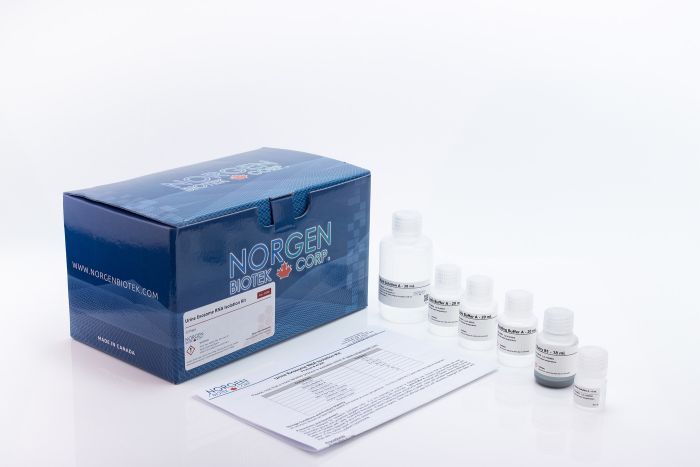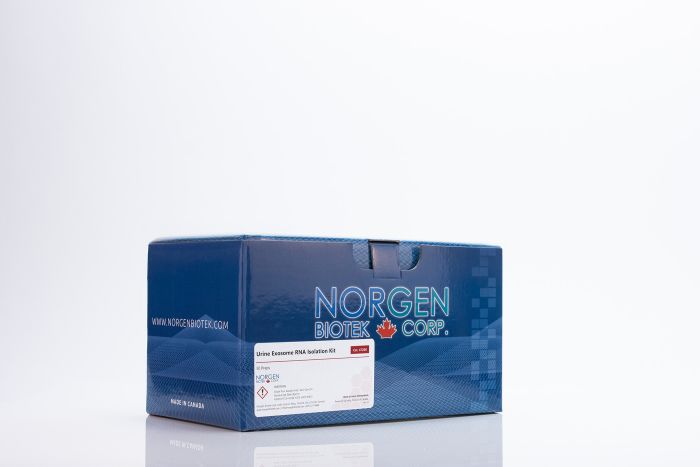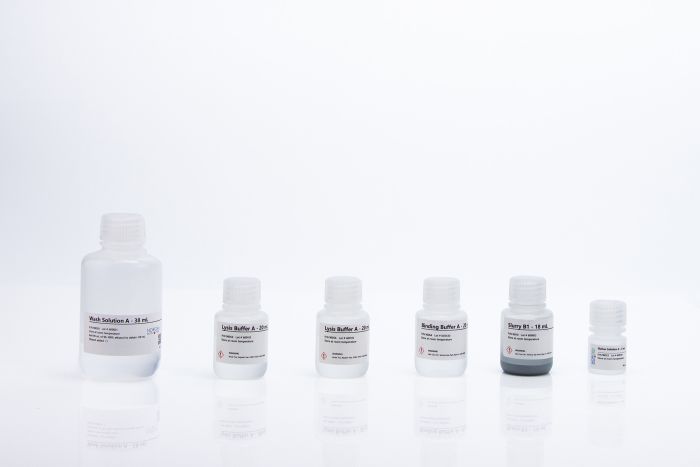Urine Exosome RNA Isolation Kit
A rapid procedure for the isolation of exosomal RNA from urine samples
For research use only and NOT intended for in vitro diagnostics.
A rapid procedure for the isolation of exosomal RNA from urine samples






For research use only and NOT intended for in vitro diagnostics.
A rapid procedure for the isolation of exosomal RNA from urine samples
Register today to receive an exclusive 15% off* on your first order.
This kit provides a rapid spin column procedure for the isolation of exosomal RNA from urine samples. Users can simultaneously concentrate and isolate high quality exosomal RNA, including microRNA, for use in sensitive downstream assays such as RT-PCR, qRT-PCR, NGS, microarrays and more. The protocol can be completed in under 50 minutes. Urine volumes of 1 to 10 mL can be processed easily and rapidly. All sizes of RNA are recovered at an equal rate without the need for using hazardous chemicals like phenol.
Background
Exosomes are 40 - 150 nm membrane vesicles, which are secreted by most cell types. Exosomes can be found in saliva, blood, urine, amniotic fluid and malignant ascite fluids, among other biological fluids. These vesicles act as cellular messengers, conveying information to distant cells and tissues within the body. The exosomes contain cell-specific proteins, lipids and RNAs, which are transported to other cells, where they can alter function and/or physiology. These exosomes may play a functional role in mediating adaptive immune responses to infectious agents and tumours, tissue repair, neural communication and transfer of pathogenic proteins. Recent work has demonstrated the presence of distinct subsets of microRNAs within exosomes which can inform about the cell type from which the exosomes are secreted. For this reason, exosomal RNAs may serve as biomarkers for various diseases including cancer. As the RNA molecules encapsulated within exosomes are protected from degradation by RNases they can be efficiently recovered from biological fluids, such as urine.
Figure 1. Detection of Urine Exosomal RNA Isolated from Different Urine Volumes. Norgen's Urine Exosome RNA Isolation Kit was used to isolate urine exosomal RNA from different urine volumes ranging from 1 to 15 mL. The purified urine exosomal RNA was then used as the template in an RT-qPCR reaction to detect the human 5S rRNA. 3 μL of the isolated urine exosomal RNA was used as the template in the RT step, and 3 µL from the RT step was used in the qPCR reaction. As it can be seen, the qPCR was able to successfully detect and amplify the 5S rRNA from exosomal RNA isolated from different urine volumes, indicating its high quality.
Figure 2. Effective and Consistent Detection of Urine Exosome RNA. Norgen's Urine Exosome RNA Isolation Kit can effectively isolate RNA from urine. Urine exosome RNA was isolated from 5 mL of human cell-free urine using Norgen's Urine Exosome RNA Isolation Kit (green), ExoQuick-TC Exosome Precipitation Reagent (blue) and Amicon® Ultra-15 Filter (blue). Stem loop RT-qPCR using primers specific to miR-21 and miR-16 as well as the housekeeping 5S rRNA was performed. In brief, three microliters of the 100 µL isolated RNA was then subjected to a 20 µL reverse transcription reaction using 5S rRNA, miR-21 and miR-16 stem-loop reverse primer or reverse primer. 3 μL from the reverse transcription reaction was used in a 20 µL real-time PCR reaction with primers to detect the human miR-21, human miR-16 and the 5S rRNA. Norgen's Urine Exosome RNA Isolation Kit is the only product that showed consistent detection of all tested transcripts with the highest quality.
Figure 3. High Diversity and Consistency of miRNA Recovered from Urine. Mid-stream urine was collected from three different healthy individuals. RNA was isolated from 20 mL of each sample using Norgen's Urine Exosome RNA Purification Kit (Cat. 47200). Small RNA Libraries were then generated using an Illumina TruSeq Small RNA Library Preparation Kit and subsequently sequenced on an Illumina MiSeq system. The normalized read counts of the mapped miRNAs were then compared between each individual sample. The scatter plots showed that the miRNA diversity was highly conserved among all individuals tested (R2 ≥ 0.92). This suggests that Norgen's RNA purification workflow recovers consistent profiles of small RNAs. This could enhance the possibility of detecting potential urine-based small RNA biomarkers.
Figure 4. High Degree of Overlapping of miRNA profile between Urine and Plasma. Plasma and mid-stream urine was collected from three different healthy individuals. RNA was isolated from 20 mL of each urine sample using Norgen's Urine Exosomal RNA Purification Kit (Cat. 47200) and 200 µL of each plasma sample using Norgen's Plasma/Serum RNA Purification Mini Kit (Cat. 55000). Small RNA Libraries were then generated using an Illumina TruSeq Small RNA Library Preparation Kit and subsequently sequenced on an Illumina MiSeq system. The list of mapped miRNAs from plasma and urine from the same individual was then compared. The Venn diagrams showed that the miRNA profiles have a high degree of overlapping between urine and plasma within each individual.
Figure 5. Increased Diversity of Other Small RNA Species (Piwi-Interacting) in Urine. Plasma and mid-stream urine was collected from three different healthy individuals. RNA was isolated from 20 mL of each urine sample using Norgen's Urine Exosomal RNA Purification Kit (Cat. 47200) and 200 µL of each plasma sample using Norgen's Plasma/Serum RNA Purification Mini Kit (Cat. 55000). Small RNA Libraries were then generated using an Illumina TruSeq Small RNA Library Preparation Kit and subsequently sequenced on an Illumina MiSeq system. The above chart shows that the relative proportion of piwi-interacting RNA (piRNA) was consistently higher in urine.
Figure 6. Western blot analysis of Norgen-enriched uEVs (urinary Extracellular Vesicles) from BPH (benign prostatic hyperplasia) and PCa (Pancreatic Cancer) urine samples. (Royo F, et al. Different EV enrichment methods suitable for clinical settings yield different subpopulations of urinary extracellular vesicles from human samples. Journal of Extracellular Vesicles. 2016;5:10.)
Figure 7. EV pellets recovered by Norgen’s Urine Exosome RNA Isolation Kit (Cat. 47200) kit were visualised by EM (Electron Microscopy) for sizing (Crossland RE, Norden J, Bibby LA, Davis J, Dickinson AM. Evaluation of optimal extracellular vesicle small RNA isolation and qRT-PCR normalisation for serum and urine. J Immunol Methods. 2016 Feb;429:39-49.)
|
Kit Specifications
|
|
| Minimum Urine Input |
1 mL
|
| Maximum Urine Input |
10 mL
|
| Size of RNA Purified |
Small exosomal RNA species
|
| Time to Complete Purification |
~ 50 minutes
|
Storage Conditions and Product Stability
All buffers should be kept tightly sealed and stored at room temperature. This kit is stable for 2 years after the date of shipment.
| Component | Cat. 47200 (50 preps) |
|---|---|
| Slurry B1 | 18 mL |
| Binding Buffer A | 20 mL |
| Lysis Buffer A | 2 x 20 mL |
| Wash Solution A | 38 mL |
| Elution Solution A | 6 mL |
| Mini Filter Spin Columns | 50 |
| Collection Tubes | 50 |
| Elution Tubes (1.7 mL) | 50 |
| Product Insert | 1 |
| Title | Protein Complexes in Urine Interfere with Extracellular Vesicle Biomarker Studies |
| Citation | Journal of Circulating Biomarkers 2016. |
| Authors | Magda Wachalska1,2, Danijela Koppers-Lalic3,4, Monique van Eijndhoven3, Michiel Pegtel3, Albert A. Geldof1, Andrea D. Lipinska2, R. Jeroen van Moorselaar1 and Irene V. Bijnsdorp1 |
| Title | Polyomavirus JC microRNA expression after infection in vitro |
| Citation | Virus Research 2016. |
| Authors | Irene Giovannellia, Valeria Clausia, Souichi Nukuzumab, Nunzia Della Malvaa, Daniele Nosia, Simone Giannecchini |
| Title | Investigation on torquetenovirus (TTV) microRNA transcriptome in vivo |
| Citation | Virus Research 2016. |
| Authors | Vignolini, T., Macera, L., Antonelli, G., Pistello, M., Maggi, F., & Giannecchini, S |
| Title | Edible ginger-derived nanoparticles: A novel therapeutic approach for the prevention and treatment of inflammatory bowel disease and colitis-associated cancer |
| Citation | Biomaterials 2016. |
| Authors | Zhang, M., Viennois, E., Prasad, M., Zhang, Y., Wang, L., Zhang, Z., ... & Merlin, D |
| Title | Different EV enrichment methods suitable for clinical settings yield different subpopulations of urinary extracellular vesicles from human samples |
| Citation | Journal of Extracellular Vesicles 2016. |
| Authors | Felix Royo1,2, Patricia Zun˜ iga-Garcia1 , Pilar Sanchez-Mosquera1 , Ainara Egia3 , Amparo Perez4 , Ana Loizaga4 , Raquel Arceo4 , Isabel Lacasa4 , Ainara Rabade4 , Edurne Arrieta3 , Roberto Bilbao3 , Miguel Unda4 , Arkaitz Carracedo1,5 and Juan M. Falcon-Perez |
| Title | Comparative miRNA Analysis of Urine Extracellular Vesicles Isolated through Five Different Methods |
| Citation | Cancers 2016. |
| Authors | Royo, F., Diwan, I., Tackett, M. R., Zuñiga, P., Sanchez-Mosquera, P., Loizaga-Iriarte, A., ... & Carracedo, A |
| Title | Clinical verification of a novel urinary microRNA panal: 133b, -342 and -30 as biomarkers for diabetic nephropathy identified by bioinformatics analysis |
| Citation | Biomedicine & Pharmacotherapy 2016. |
| Authors | Eissa, S., Matboli, M., & Bekhet, M. M |
| Title | Exosomal MicroRNAs Are Diagnostic Biomarkers and Can Mediate Cell-Cell Communication in Renal Cell Carcinoma |
| Citation | European Urology Focus 2015. |
| Authors | Henriett Butza, b, Roy Nofech-Mozesa, Qiang Dinga, Heba W.Z. Khellaa, Peter M. Szabóc, Michael Jewettd, Antonio Finellid, Jason Leee, Michael Ordone, Robert Stewarte, Sergey Kreylovf, George M. Yousef |
| Title | Exosomal lncRNAs may to Help Distinguish Prostate Cancer from Benign Disease |
| Citation | Frontiers in Genetics 2015. |
| Authors | M Isin, E Uysaler, E Ozgur, H Koseoglu, O Sanli, OB Yucel, U Gezer, N Dalay |
| Title | Evaluation of optimal extracellular vesicle small RNA isolation and qRT-PCR normalisation for serum and urine |
| Citation | Journal of Immunological Methods 2015. |
| Authors | Rachel E. Crossland, , Jean Norden, Louis A. Bibby, Joanna Davis, Anne M. Dickinson |